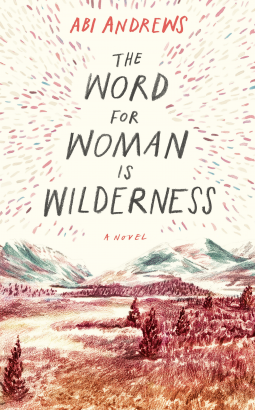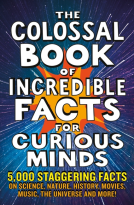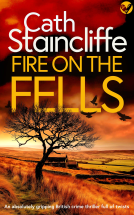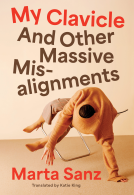
The Word for Woman is Wilderness
by Abi Andrews
This title was previously available on NetGalley and is now archived.
Send NetGalley books directly to your Kindle or Kindle app
1
To read on a Kindle or Kindle app, please add kindle@netgalley.com as an approved email address to receive files in your Amazon account. Click here for step-by-step instructions.
2
Also find your Kindle email address within your Amazon account, and enter it here.
Pub Date Feb 01 2018 | Archive Date Feb 01 2018
Serpent's Tail / Profile Books | Serpent's Tail
Description
Available Editions
| EDITION | Other Format |
| ISBN | 9781781259078 |
| PRICE | £12.99 (GBP) |
| PAGES | 320 |
Featured Reviews
 Neil G, Reviewer
Neil G, Reviewer
This is an adventure novel unlike any adventure novel you have read before (I think so, anyway: clearly, I haven’t read all of them, so I can’t be sure). There are two reasons for this. Firstly, the author, Abi Andrews, takes her female protagonist, Erin, into what has historically been a man’s world: exploring the wilderness. Secondly, the book’s mixture of fact and fiction is so well constructed that without the phrase "A Novel" in the title you could be forgiven for thinking you are reading a travel diary, albeit a very literary one. What we get when these two combine is a "feminist documentary on wilderness".
That first characteristic, a woman in a man’s world, is key. Without doubt this (at least, the first 80% of it) is a feminist book setting out to show the injustice and oppression of the patriarchy that has dominated society.
After watching a film about Chris McCandless, Erin makes a decision to take a road trip across Canada in order to stay on her own in a remote cabin in Alaska.
"I cried and promised myself I would start a savings account to fund a trip to Alaska, where I too could live in the wilderness in total solitude. Then I went through the film step by step and analysed how it would have been different if the guy had been a girl."
Because
"Even on those documentary channels that do programmes on whole families homesteading in the wilderness the woman is always Mountain Man’s wife, never, ever Mountain Woman, just an annexe of the Mountain Man along with his beard, pipe and gun."
She decides that she will use a video camera to capture events and interviews with people she meets and to create a documentary for which she has great plans on her return. The way the documentary and her feelings about it develop are fascinating elements of the story: the documentary serves as a way of filtering experiences to decide what or how things matter.
For a while, I was a bit worried that the premise of the book seemed to be “man has subjugated woman and man has subjugated nature, therefore women and nature should have an affinity”. I wasn’t sure about quotes like:
"Cetaceans are women’s allies in the war against patriarchy because patriarchy holds the cetaceans down with us. Orcas travel in matriarchal pods. The root of the word dolphin, delphus, means womb."
But, as the story and the philosophy develop, they become more and more compelling and coherent. I am not saying I am in 100% agreement and am converted to Erin’s views of women’s place in the world and the right way to live, but her thoughts are well put together and make for an engrossing, thought-provoking read.
The book is the story of her journey and the time she spends alone in Alaska. The journey to Alaska includes a number of incidents that confirm Erin’s view that it is a man’s world (mainly unwanted sexual attention).
Mixed in with the events, Erin takes time to record her thoughts about a wide variety of topics, all of which she connects together. So, we get a travel documentary filled with feminism, biography and then also thoughts about things such as the Voyager space missions, the lunar landings, time capsules, the Golden Records, Rachel Carson, the Unabomber, Jack Kerouac and many others. Gradually, all of these different topics converge and connect and the final 20% of the book becomes Erin’s philosophy for life which is largely based on the Inuit philosophy of metempsychosis:
"Metempsychosis. That is what the Ancient Greeks called the transmigration of souls, similar to what the Inuit believe in. E=mc2 is the famous equation by Einstein and what it means is that the amount of energy in a particle is equal to its mass times the speed of light squared, and what this means is that the Inuits are right again. It means that energy and mass or matter are interchangeable."
This combination of story and contemplation gives the book the feel of a documentary rather than a work of fiction (and clearly not everything in it is fiction). Andrews' writing is vivid and observant: I was left feeling that someone somewhere must have lived all of this given the detail as it’s hard to imagine someone thinking of all that without experiencing it.
"We walked inland through the mountains against the meltwater of the glacier as it found its way to the sea. It was urgent, dense and grey; panicked like a jar of paintbrush water knocked onto a meticulous landscape."
Alone in Alaska, Erin’s thoughts get more and more extravagant and include dream sequences. It is this that helps her pull it all together and leads us to the final sections of the book which focus more on philosophy and how to live life.
You don’t have to agree with everything Andrews gives Erin to say and think, but, even if you don’t, there is plenty of food for thought in what Erin discusses. The story is fairly straightforward, but is well written. The combination of story and contemplation makes this an absorbing book.
To be published by Serpent’s Tail, I received a free review copy from the publisher in exchange for my honest unedited feedback.
 Paromjit H, Reviewer
Paromjit H, Reviewer
Abi Andrews has written a remarkably ambitious and thought provoking meditation on what it is to be a woman with strong connections to the earth, the environment and the wilderness. She develops a philosophy through the young 19 year old Erin, a brave and courageous woman, who embarks on a thrilling and enthralling adventure through the Arctic wilderness and across the US. It begins with a reflection on why it is men who are explorers and adventurers, such as Bear Grylls. She watches a Chris McCandless documentary which provides the impetus for the far reaching decision to travel across the Arctic through a difficult road trip and eventually choosing to live in an isolated cabin in Alaska completely alone. She undertakes the mission of making her own video documentary and biography, filming interviews with people and the events that she encounters, including her personal impressions and emotional feelings on the whole process. This is an extraordinary challenge to the tenet that this is a man's world.
I loved Erin's exploration of a wide and diverse range of subject matter, crucial to the development of a universal feminist philosophy on the protection of the wondrous wilderness, connecting the threads of her thinking on being a woman with that of the need for environmental protection. She draws on Inuit approaches on life and death in her conclusions. This is a terrific story of adventure, original in its construction of a philosophical approach to the study of feminism, with a Erin who is implacable in her determination to protect the wilderness she is bewitched by and loves. A wonderfully brilliant read that makes a change from my usual reading fare. Highly recommended! Many thanks to Serpent's Tail for an ARC.
 Paula B, Reviewer
Paula B, Reviewer
Erin is a young woman with a calling. She’s barely ventured from her home in England, but she has watched Bear Grylls’s survival programmes on TV. She wonders why it is that men, but never women, get to be intrepid adventurers, and decides to prove that it is possible for a lone female to voyage through the Arctic Circle, travel across the American continent, and survive in the Alaskan wilderness on basic rations.
She takes with her a video camera to record the journey, using it to interview people along the way, with the intention of creating a feminist documentary. But her evolving objectives regarding this film become an integral part of her odyssey – one that is sometimes fraught with danger and would certainly scare her parochial mum and dad witless should she choose to be completely open with them. She is, however, a strong-willed, resourceful character, and develops coping mechanisms such as chiding herself for growing overly attached to temporary travelling companions.
As she travels, she ruminates on the solar system, nuclear weapons, Inuit culture, cetaceans, the pill, dreams, history, nothingness and a profusion of diverse subjects. She contemplates the works of writers, travellers, scientists and philosophers like Henry David Thoreau, Jack London and James Lovelock – looking to Rachel Carson for feminal inspiration – and puzzles over what impelled men like Chris McCandless to seek enlightenment through solitude and immersion in the natural world.
Erin may be a deep thinker, but she is also great company – her perceptive humour often coming through when she is at her lowest ebb. There are amusing sub-headings strewn throughout the narrative, with titles like: MANNED SPAcE FLIgHT IS THE TROPHY WIFE OF THE SuPER-PHALLUS, and I found myself chuckling at some of her throwaway remarks.
When eventually she reaches her isolated cabin in Denali, her experiences thereafter sometimes remind me of those recounted by Sara Maitland in her 2009 memoir, A Book Of Silence, in which the author spent long periods of time living alone in remote places. Like Erin, she was occasionally perplexed by unsettling, if not downright creepy mental images. There were times when she was unsure if she was awake or asleep, and if the things she saw were real or merely brought about by lack of human contact. So it proves for Erin.
So authentic is the protagonist’s voice that in many ways The Word for Woman is Wilderness seems more non-fiction travelogue than novel. Moreover, if I hadn’t been informed otherwise, I might have assumed Erin was American. Her first-person interior-monologue doesn’t have a particularly British feel to it – in fact, it could be described as mid Atlantic – but I have no doubt this is a generational thing. These days young people use a globalized form of English, and Erin is a mere 19 years-old. The author herself is in her late twenties, while I’m in my early fifties, so our use of language will inevitably differ.
There is much to admire in Abi Andrews’ debut novel. She has created an inspiring character in Erin, one you will think of long after reading the final page. This book appealed to me at first because I am fascinated by countries like Iceland and Greenland, and I was also intrigued by the description of a young woman challenging the archetype of the rugged male explorer. By the time it ended, an abundance of anomalous thoughts were coursing through my brain. I could ask for no more.
 Lauren L, Bookseller
Lauren L, Bookseller
Incredibly fresh, The Word for Woman is Wilderness is a road trip book, with Erin starting from England to trace the paths of Kerouac, Jack London and, bizarrely, the Unibomber Ted Kaczynski to Alaska. Reflecting the intellectual excitement, moral aspirations and occasional emotional obtuseness of a brilliant young adult, the novel is humorous and occasionally harrowing. Written as a diary and notes for a documentary film project, the art of the author is to allow Erin to go so deeply into her thoughts, when holed up alone in a cabin in Alaskan wilderness, that it seems she may never escape. I am thrilled to have read this book and most impressed by Abi Andrews' abilities.
Many thanks to Netgalley and the publisher of this book for allowing me to read a copy for free in exchange for an honest review. The title and concept caught my eye and imagination immediately and I wasn't at all disappointed once reading. I was slightly sceptical as to the choice of novel/fictional travel journal as a vehicle for the authors thoughts on this subject, she could easily have produced a book of essay/a concise and interesting work of non-fiction - but it works well presented as a young woman's journey of discovery and growth,...and as such I think provides a more enjoyable and interesting for a younger readership particularly. I will certainly be recommending this book to teens and young adults. There is much to learn here and many jumping off points for discussion and further research,. The tale includes various aspects of feminist theory, history, science, literature, and geography, encapsulated in a well written novel of complex subject but also depth of emotional involvement which pulled me in and held my interest throughout.
 Eric A, Reviewer
Eric A, Reviewer
Sometimes it can be so difficult to separate my emotional response to a book compared to my critical response. I don't think I necessarily have to which is one of the great things about a book blog! But reading Abi Andrews' debut novel “The Word for Woman is Wilderness” I was even more aware of this dilemma because it's inspired by and about subjects I'm really interested in and sympathetic towards. It's narrated from the perspective of nineteen year old Erin who has a passionate interest in the writing of Thoreau and the life of Christopher McCandless whose tragic journey led to his accidental death in the Alaskan wilderness. This was chronicled in Jon Krakauer's nonfiction book “Into the Wild” and a film with the same name directed by Sean Penn. Erin observes how the famous instances of individuals pioneering into the wilderness to establish a distance from the society whose values they question have all been directed through a men's perspectives. Certainly the experience and perspective of a woman who sets out on such a journey would be very different. So (against her parents' wishes) she ventures out from her home in England to the Alaskan wilderness and chronicles her journey on video with the plan to edit it into a documentary. She states: “if running into the wild is so often a wounded retreat from societal constraints and oppressions, then shouldn’t anyone but straight white men be doing it more?” Erin charts the mental and physical struggles she faces on her way while also contemplating both the dynamic distinctions and commonalities between the journey of mankind vs womankind.
The novel is evenly broken up into two sections: Erin's journey through the Arctic circle and hitchhiking across Canada to arrive in Alaska and her time inhabiting a remote cabin in the unpopulated wilderness. But throughout she makes references and draws in concepts from an enormous amount of sources: everything from quantum mechanics to Cartesian philosophy to the history of the Cold War space race to David Attenborough documentaries to the novels of Jack London. Such a dizzying array of topics is impressive and fascinating. It leads her to propose enticing new connections and pose deeply-thoughtful questions. But it has the effect of feeling like you've sat up all night with a fellow university student who is excitedly talking through everything they've been reading about. It can get a bit overwhelming at points and detract from the through line of the narrator's journey. Along the way Erin encounters several fascinating characters from an Icelandic woman she meets on a ship to a Native American who aides her after meeting a nasty trucker to a misogynistic interloper in Alaska. It felt like if Andrews had spent longer developing scenes with these characters and rounding out their personalities the novel would have felt more like a story than a collection of interesting concepts.
Erin's determined will to enter the wilderness leads the story. There are some beautifully poetic observations about our subjective experience of landscapes and the environment. When viewing the barren icy terrain of Greenland she states “It feels like trespassing to be alive in a place that is not dead but is inexistence, negation of potentiality. Anything alive is only ever passing through.” Then, at another point she remarks how “The tundra is always in soliloquy. Mostly it whistles and sings, but now and then the wind will die down suddenly and in the utter silence and still it feels like you are on stage. As though you did not know there were curtains until they just suddenly opened. Then the cacophony of noise again like applause.” There are also some great comic moments where she makes wry observations about the nature of travel like trying to understand the native language of a country you've entered through travel books: “I enjoy the narratives of phrase books. They always seem to follow a haphazard protagonist who is forever getting lost and bothering the emergency services.”
Of course, it's Erin's inner journey which is the real focus on this novel. She comments how “An esoteric landscape does not help a person to find their way if they are lost; you could walk from the centre of here and never find your way again.” It's necessary for her to physically travel in order to arrive at a new place of understanding and radically reform her sense of self. It's also necessary that it's a journey she makes alone: “It is not a casting out with purpose but a getting lost. It is the difference between solitude and loneliness.” It's touching how her time in Alaska leads her to reflect much more strongly about her own upbringing and the machinations of her psychology. She's aware of how much she's internalized stories of explorers as being strictly male enterprises because almost all the literature about it is written by men. She catches herself “Positioning myself as male again; my masculine counterpart who lives in my brain, appending a fraud penis so I can traverse Scott’s Antarctica in my imagination.” The fact of her journey makes a powerful statement that women also enter (both the spatial and inner) Wilderness. So, while I think it's sometimes too erratic, this novel was a great pleasure for me to read and it's also a flag that needed to be planted because Abi Andrews is marking new terrain.
3.5 stars
The Word for Woman is Wilderness, the debut novel by Abi Andrews, introduces us to a teenage feminist explorer who ventures through the Arctic Circle, across the continent of America and on to Alaska, all in the name of woman.
19-year-old Erin leaves her home in England and embarks on a journey that challenges both herself and the male dominated world of exploration. Drawing on the experiences of Bear Grylls and Christopher McCandless, Erin writes her own feminist narrative on nature and the wilderness. In one of the most ambitious musings I have read in a long time, our protagonist tackles topics from space travel, climate change and physics to gender theory and ecological science. Her knowledge on literature and nature is vast, and her ponderings on feminist writing, technology and patriarchy prove quite interesting.
Erin is making a video documentary of her travels, logging her experiences on cargo and research ships across the Atlantic, her stints in Iceland and Greenland, her hitchhiking adventures across Canada and her eventual habitation of a cabin in Alaska’s Denali national park. There are some scenes that will amuse you and some that will worry you, particularly those that involve her hitchhiking at night (or maybe that’s the mother in me talking!). While I found Erin to be engaging, well read and witty, I felt that her intelligence and knowledge was often called into question by her use of teen-speak, swearing and, in parts, poor grammar and choice of vocabulary. Her opinions are often ageist, with Erin believing it is the adults in the world who are responsible for ruining anything good about it. At times like this, I found myself becoming irritated by her. I am a millennial myself (just about) but I found Erin’s arguments, musings and opinions to be particularly...well...millennial.
An all-encompassing, ambitious and impressive read, ultimately, with thought provoking discussions of feminism, gender, nature and the wilderness. Recommended to fans of women’s writing, feminist theory or nature writing, or anyone who would like a teenage, millennial revision of the work of Jack London.
Readers who liked this book also liked:
Nigel Henbest; Simon Brew; Sarah Tomley; Ken Okona-Mensah; Tom Parfitt; Trevor Davies; Chas Newkey-Burden
Entertainment & Pop Culture, Humor & Satire, Nonfiction (Adult)


















